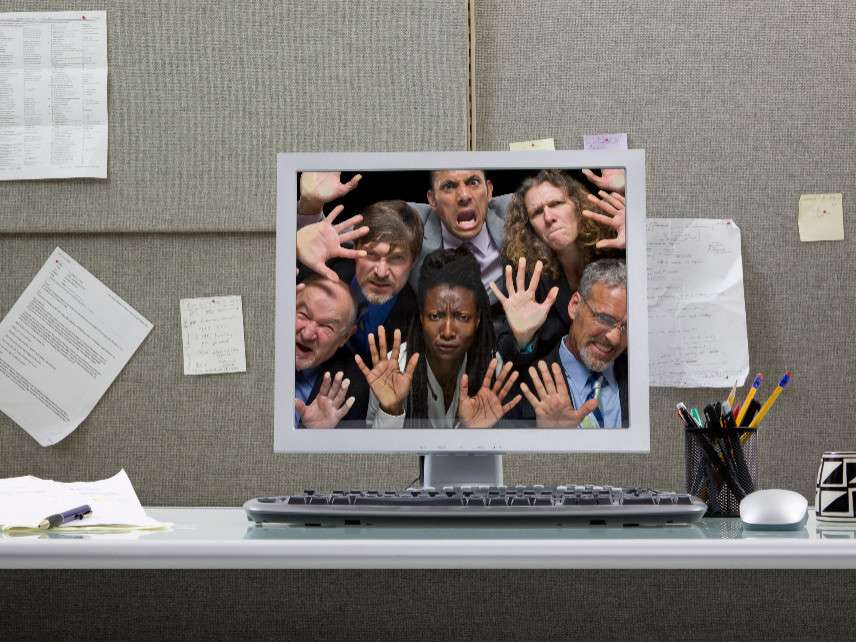How the Internet Is Now Making Us Less Free: Reason Roundup
Plus: FDA greenlights new 23andMe test, Kamala Harris gets the Onion treatment, and nobody likes Trump's new shutdown salve.

"Context collapse" could explain more than just recent culture wars. The early days of the internet were full of anonymity and walled-off digital estates—an array of forums, blogs, and niche networks where one was free to be fully themselves or someone else entirely. Each platform had its own context. But the past decade or so has seen a steady decrease in that aesthetic, by both design (in some cases, as on Facebook) and happenstance.
And that, in turn, has brought increasing levels of what's sometimes called context collapse—defined by Norwegian researcher Petter Bae Brandtzæg as "the flattening of multiple audiences into a single context [that] has been an important notion in research on privacy experiences, self-performance, and changing user practices in social media."
Conor Friedersdorf explores this concept this week at The Atlantic, as it relates to recent social media-driven controversies. He notes an answer University of Michigan Professor Elizabeth Anderson recently gave about the historic thawing of tensions between European Catholics and Protestants:
People now have the freedom to have crosscutting identities in different domains. At church, I'm one thing. At work, I'm something else. I'm something else at home or with my friends. The ability not to have an identity that one carries from sphere to sphere but, rather, to be able to slip in and adopt whatever values and norms are appropriate while retaining one's identities in other domains? That is what it is to be free.
Industrialization and urbanization took us in this direction, too. And "if humans lost something when most of us ceased to live our whole lives in small tribes," writes Friedersdorf, "if American life is no longer organized around small towns with all that they offer their residents, at the very least we made these countervailing gains. And this freedom to be different things in different spaces was enhanced by the early internet."
But under Anderson's freedom rubric, the internet in its most recent dominant incarnation is making most of us a lot less free.
Pick any recent Twitter outrage turned days-long national controversy and you can see context collapse at play. But it goes beyond this. Look at a lot of the problems sex workers run into with banking, social platforms, web services, etc. and you can see context collapse at play. Look at the lust to get people fired from positions completely unrelated to their supposed years-old transgressions. Look at the mixups and privacy fears spawned by "People You May Know" features and browser/phone data that follows you everywhere. Look at the federal courts and Justice Department parsing emojis.
Friedersdorf wonders "whether ongoing debates about matters as varied as Facebook user-data practices, 'the right to be forgotten,' NSA data collection, and any number of public-shaming controversies are usefully considered under the umbrella framework of How is new technology affecting our ability to keep our various worlds from colliding when we don't want them to, and what, if anything, should we do about that?"
Read the whole piece here.
FREE MINDS
The more you know:
Royal Society for Public Health says "nicotine is no more harmful than caffeine." Alarmingly, 90% of public regard nicotine itself as harmful. RSPH calls for public confusion to be addressed to encouraging smokers to use safer forms of nicotine. @R_S_P_Hhttps://t.co/bP934JAHE6
— Charles A. Gardner, PhD (@ChaunceyGardner) January 22, 2019
FREE MARKETS
At-home genetic testing for colorectal cancer gets greenlight.
23andMe says it got the green light from the FDA to offer consumers a test for a hereditary colorectal cancer syndrome https://t.co/XyZ7OW8liz
— Bloomberg Law (@blaw) January 23, 2019
ELECTION 2020
Of course Kamala Harris' history as a prosecutor is fair game…
Harris was, in terms of number of lives affected, one of the 5 or so most important figures in criminal justice in America. That she might have to reckon with her record—and that people might not buy her reckoning—is a pretty reasonable price of entry into the race, no?
— Dad (@fivefifths) January 22, 2019
… and The Onion takes aim: "Kamala Harris Assembles Campaign Staff Of Unpaid California Prison Laborers"
"Kamala Harris Assembles Campaign Staff Of Unpaid California Prison Laborers" https://t.co/CpMZytAmXq
— Elizabeth Nolan Brown (@ENBrown) January 23, 2019
QUICK HITS
- "A new immigration idea has been circulating over the past 24 hours at senior levels inside the White House and on Capitol Hill: Give a path to green cards to the 700,000 current DACA recipients," reports Jonathan Swan at Axios. But "nobody involved thinks that Trump's current offer has a prayer of getting the 60 votes needed to pass the Senate."
- After being released from Russian jail yesterday, Nastya Rybka failed to show up today at a press conference scheduled and publicized by her lawyer.
In one of the most epic news conferences I've ever been Rybka's lawyer said: "Maybe she'll show up, maybe not." When asked to call her and ask the lawyer refused, saying that he doesn't want to disturb her because "maybe she's having a rest." https://t.co/fjKB7A6tQd
— Nataliya Vasilyeva (@NatVasilyevaAP) January 23, 2019
- Iowa's fetal heartbeat bill has been struck down for violating the state's constitution.
- Not among Reason readers, at least:
Is there anyone so stupid that they still don't recognize that "human trafficking" is now basically just a dysphemism for "sex work"? https://t.co/3yGnNyKeOE
— Maggie McNeill (@Maggie_McNeill) January 23, 2019
- The history of LiveJournal you've all been waiting for (no? just me?).


Show Comments (248)